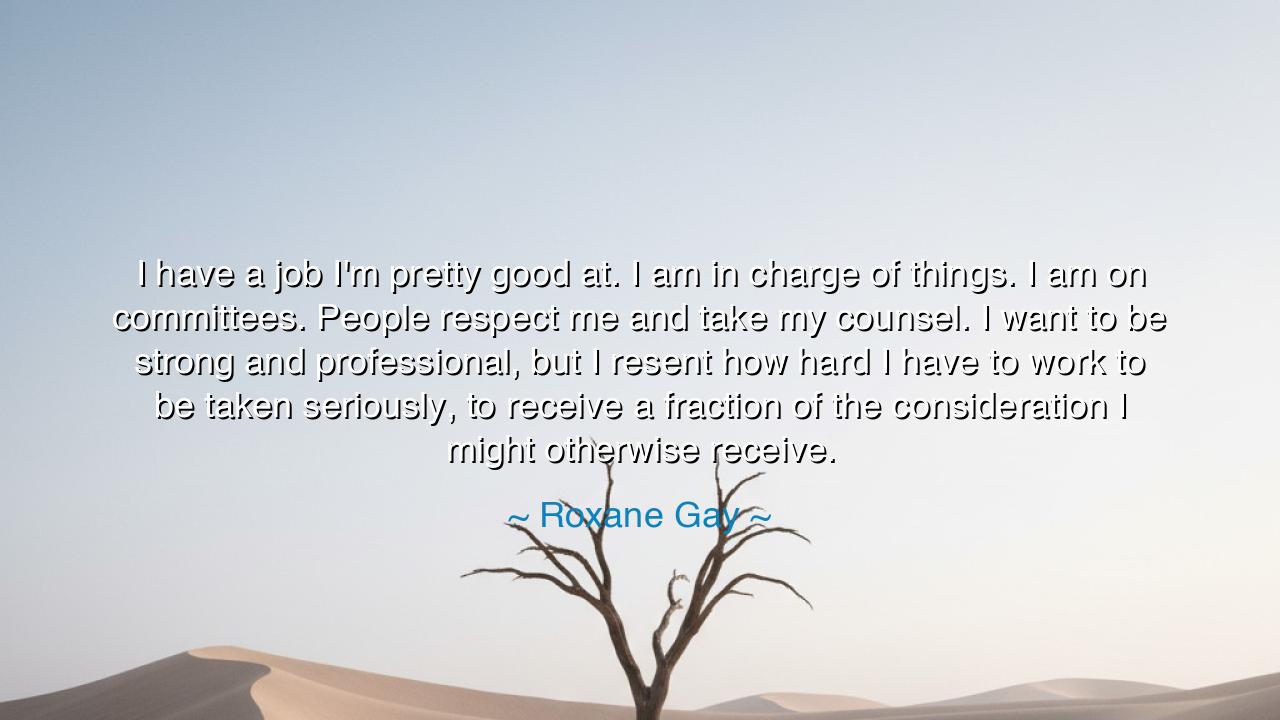
I have a job I'm pretty good at. I am in charge of things. I am
I have a job I'm pretty good at. I am in charge of things. I am on committees. People respect me and take my counsel. I want to be strong and professional, but I resent how hard I have to work to be taken seriously, to receive a fraction of the consideration I might otherwise receive.






When Roxane Gay proclaimed, “I have a job I’m pretty good at. I am in charge of things. I am on committees. People respect me and take my counsel. I want to be strong and professional, but I resent how hard I have to work to be taken seriously, to receive a fraction of the consideration I might otherwise receive,” she revealed the heavy burden borne by those who walk through life with skill and dignity, yet find the world demanding more of them than of others. Her words are not of weakness, but of truth: the road to respect is not equal for all, and often those most capable must labor twice as hard to gain half as much.
The meaning of this statement lies in the clash between outward success and inward struggle. Gay speaks of being good at her job, of holding positions of authority, of being trusted with committees and counsel. By all outward signs, she has triumphed. Yet behind these signs of power lies the sting of inequity: that despite her excellence, she must fight harder, prove more, and demand longer before she is granted the same consideration given freely to others. Her confession reveals the injustice that shadows even achievement, showing that respect in society is not always measured by merit alone.
The origin of her grievance is ancient, for throughout history, those outside the dominant class or order have been forced to prove themselves over and over. Consider the women philosophers of antiquity, like Hypatia of Alexandria, whose brilliance rivaled the greatest minds of her time, yet who was derided, attacked, and finally murdered because her authority was deemed intolerable in a world ruled by men. Her wisdom was vast, her counsel priceless, yet her path to being taken seriously was littered with obstacles that her male peers did not face. Gay’s words echo this ancient cry: that the strong are often forced to fight not only for victory, but for recognition.
History also recalls the struggles of Frederick Douglass, born enslaved, who through intellect and eloquence rose to counsel presidents and inspire nations. Yet even he wrote of the constant battle to be treated as equal, to be heard without prejudice, to have his humanity recognized. Like Gay, he could say, “I am respected, I am listened to,” yet also confess the weariness of having to labor endlessly for that respect. His story, like hers, teaches us that respect earned through struggle carries both pride and pain.
The lesson here is clear: respect must not be rationed, nor consideration made conditional. A society that forces its most capable to fight endlessly for dignity wastes the brilliance of its own people. True justice requires that merit be honored without bias, that authority be recognized without prejudice, and that dignity be granted without demanding the exhaustion of endless proof. For what is the worth of civilization, if it cannot honor those who lead with strength, wisdom, and integrity?
Practical actions flow from this wisdom. In our workplaces, in our communities, in our daily lives, we must be vigilant against the invisible weights we place on some while lifting others with ease. We must listen with openness, grant consideration without bias, and recognize authority without demanding that it be earned again and again. For each of us has the power to affirm the dignity of another — to respect not grudgingly, but freely.
Thus, Roxane Gay’s words endure as both lament and call to action. She speaks with the voice of countless others who have labored under the same burden, who have given their counsel and earned their place, yet still found themselves questioned. May we learn from her that the true measure of leadership is not only in the power one holds, but in the justice with which others respond. And may we, as heirs of this wisdom, strive to build a world where no one must labor beyond reason to be taken seriously, where respect is given not with reluctance, but with the honor all human beings deserve.






AAdministratorAdministrator
Welcome, honored guests. Please leave a comment, we will respond soon